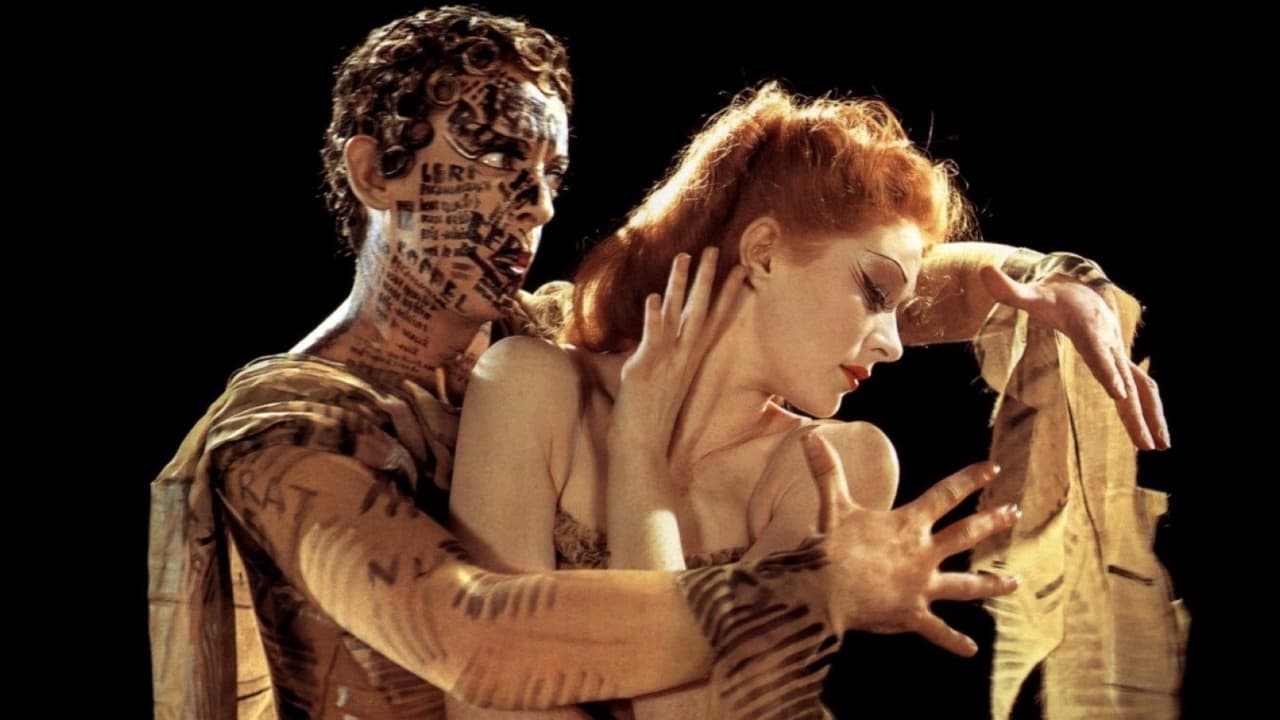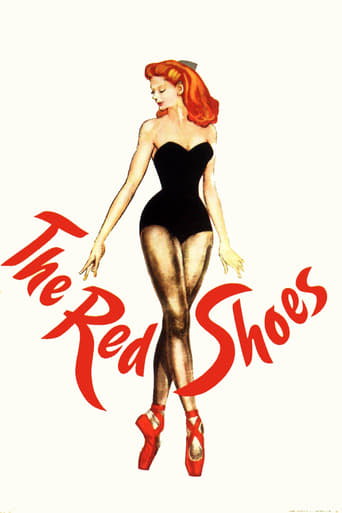Titreenp
SERIOUSLY. This is what the crap Hollywood still puts out?
Siflutter
It's easily one of the freshest, sharpest and most enjoyable films of this year.
Clarissa Mora
The tone of this movie is interesting -- the stakes are both dramatic and high, but it's balanced with a lot of fun, tongue and cheek dialogue.
Ariella Broughton
It is neither dumb nor smart enough to be fun, and spends way too much time with its boring human characters.
ib011f9545i
I am a huge Powell and Pressburger fan.
I have seen most of their films and love most of them.
I saw The Red Shoes on tv years ago and did not like it much.
I recently bought a Powell and Pressburger boxed set and am working my way through it.
I watched The Red Shoes today.
It is a stunning looking film and I found it hard to concentrate on the story.
The dance scenes are very well filmed.
Some of the reviews here are surprised that a film like this could be made in Britain in 1948,Britain made loads of great films in this period I think.
gavin6942
A young ballet dancer is torn between the man she loves and her pursuit to become a prima ballerina.Although Michael Powell had a long career with many, many films under his belt, this is probably the one he is most associated with and remembered for. And, you have to admit, rightfully so. The color is great, as is the story and everything within.The layers are nice, as this is a movie about a ballet about a fairy tale. The scene (very brief) of the men picking out the perfect red shoes is gorgeous. And then my twisted mind wonders... what if this were a horror film? You know, a story where the shoes keep dancing even after the dancer stops?
elvircorhodzic
Three words. The beauty, romance and the magic. I am a person who does not favor the music films, but some are left me speechless. Music and Ballet, the magical world of images and set design in this case are more than sufficient.The Red Shoes are movie about unlimited love, emotional misunderstanding, grace, power, intoxication, ecstasy and passion. All this in motion and life of ballet. Of course, most of the actors are professional dancers. Because of this story seems more plausible. In relations act suffers the most. The wooden and monotone. Here, I'm not talking about the dance expression. In this setting, the story is no place the development of love between the two characters.The film is extremely entertaining and directed with a lot of taste.Anton Walbrook as Boris Lermontov, in his eyes winning ballet and plays. It is excellent in the role of a violent and inspired leaders. Creative person who faithfully conveys the drama.Regardless of the duration of the film, I would have liked to "red shoes" never stop dancing. That's the point, everything else is superfluous.The main character Moira Shearer (Vicky Page) is romantic and full of charm. Marius Goring as Julian Craster is a young composer who steals the heart of the main ballerina. Romance is vague and unconvincing.The film must see everyone and enjoy in the beautiful shades of color and interesting scenery.
GusF
Taking its name from the 1845 fairy tale by Hans Christian Andersen which proves vital to the plot, this is an excellent dancing extravaganza / psychological drama. I have never been to the ballet and I don't know too much about it but I know what I like and I simply adored this film. The choreography by Robert Helpmann and Léonide Massine is exquisite and the score by Brian Easdale and Sir Thomas Beecham complements it perfectly. The central performance of "The Ballet of the Red Shoes" is a joy to behold and the Technicolor cinematography of Jack Cardiff adds to the veritable visual feast immensely. It was a wise decision on Powell and Pressburger's part to make the ballet performance itself as cinematic and fantastical as possible rather than feel constrained by what would be possible to achieve on stage. As such, the audience is made to feel as if they have been transported to another world, something which all of the best performances / stories should do. All of these spectacular elements fit together perfectly but other things are needed to make a film successful and two of the most important of those are strong writing and direction. It is hardly surprising that Powell and Pressburger managed to deliver very impressive results on those fronts, given their track record. The stellar script has many interesting parallels to the fairy tale to the extent that the characters seem almost doomed to live it out. The film does not really hit its stride for about 35 minutes but, after that, it was never less than completely engrossing.While she may not be on the same level in terms of acting as previous Powell and Pressburger collaborators such as Deborah Kerr, Kim Hunter and Kathleen Byron, Moira Shearer is quite good as Vicky Page and seems to get better as the film progresses. Of course, she was not cast for her acting ability but for her superlative skills as a dancer. It was always a delight to watch her dance so she was the perfect choice for the role. A very ambitious young woman, she seeks the opportunity to dance under the tutelage of Boris Lermontov, a brilliant but ruthless impresario. She tells him that she lives to dance and nothing has ever meant as much to her. However, she develops a relationship with the Ballet Lermontov's composer Julian Craster, played very well by Marius Goring. After Lermontov fires Julian, she tells him that she will not continue at the Ballet Lermontov without him and she makes an unhappy exit from the most prestigious ballet company in the world. She and Julian soon marry but she becomes torn between her art and her love for him.The cold, calculating and emotionally repressed Lermontov is played with a sort of understated menace by Anton Walbrook, who certainly gives the best performance in the film. He is a rather strange character. Over time, he develops an unhealthy obsession with Vicky to the point that he can think of little else about her. However, there is no indication that his obsession is fueled by sexual desire. It is instead fueled by his oft-stated desire to transform her into the greatest ballet dancer that the world has ever known. He becomes extremely resentful of Julian when it becomes clear that his relationship with Vicky is more than mere infatuation. I think that he views her as being essentially an object to be moulded in the same way that a sculptor might view a slab of marble before he has carved a figure out of it. He does not really care for or about her as a person, only as a dancer.Eventually, Vicky realises that she cannot live without dance and rejoins the company. Julian confronts her and his presence forces her to choose between ballet and him. She is unable to do so and becomes hysterical but Julian leaves as he believes that all hope of a normal life with her has been lost. The experience shatters Vicky and her emotional instability leads to what can perhaps best be described as a moment of temporary insanity as she flings herself off the balcony onto the path of an oncoming train. She manages to survive for several minutes and, with her dying breath, asks Julian to remove her red shoes, which is exactly what happens at the end of the ballet. I think that this represents the fact that she, like her character, had no choice but to dance until she died and only in death could see get any release. As well as choreographing the film, Robert Helpmann and Léonide Massine acted and danced in it as Ivan Boleslawsky and Grischa Ljubov respectively. They were both good actors but watching them dance with Moira Shearer reminded me of the experience of watching more or less any Laurence Olivier film or Kenneth Branagh and Judi Dench in "The Winter's Tale" at the Garrick Theatre: I knew that I was unlikely to ever see a better example of the relevant craft in person or on screen. Powell and Pressburger regular Esmond Knight is excellent in the supporting role of the composer Livingstone Montagne, who resented the younger and more talented Julian. In that sense, he reminded me of the way that Salieri was depicted vis-à-vis Mozart in "Amadeus". The film also features nice small appearances from Austin Trevor, George Woodbridge, Irene Browne and a very young and uncredited Leslie Phillips in the first scene. Towards the end of the film, the distinctive voice of Patrick Troughton can be heard as a BBC radio announcer but he is likewise uncredited.Overall, this is a superb film. The less serious elements might have made a fun 1930s Fox musical starring Don Ameche and Alice Faye but the darker, psychological ones were not the sort of the thing that Hollywood would include in a musical for many years to come.

